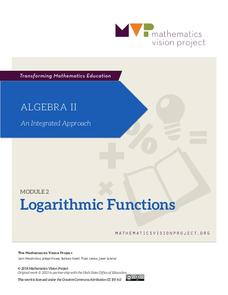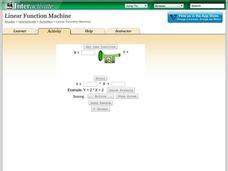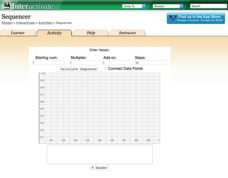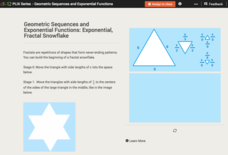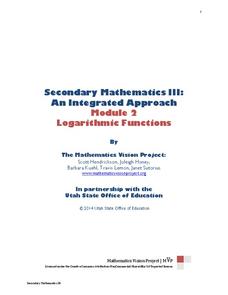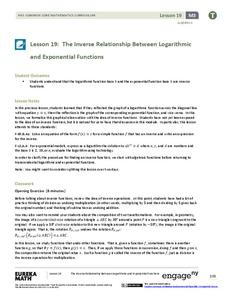Curated OER
Algebra Cheat Sheet
Full of info, this handout provides the rules, properties, and common mistakes found in an algebra course. This cheat sheet is a great resource for those hard-to-remember exponent rules and hyperbola equations, along with everything else...
Mathalicious
Pandemic
Young scientists use exponential growth and logarithms to model how a virus spreads through a population. Pupils watch a news clip about the 2012 outbreak of Ebola. Scholars then manipulate inactive graphs to see how various factors...
Mathematics Vision Project
Module 2: Logarithmic Functions
You can't build a fire with these logs! Filled with hands-on investigations, a complete logarithmic unit offers both instruction and practice. Learners first build an understanding of the new function, then explore properties before...
Concord Consortium
Defining Logarithms
An inverse relationship exists between exponents and logarithms, allowing mathematicians to easily convert one to the other. Scholars apply a brief definition of logarithms with a few practice problems. Then, they discover the...
Shodor Education Foundation
Multi-Function Data Flyer
Explore different types of functions using an interactive lesson. Learners enter functions and view the accompanying graphs. They can choose to show key features or adjust the scale of the graph.
Shodor Education Foundation
Linear Inequalities
An interactive lesson helps individuals learn to graph inequalities in two variables. Scholars can adjust the interactive to present the inequalities in standard or slope-intercept form.
Shodor Education Foundation
Linear Function Machine
What goes in must come out! Learners play with a function machine to determine the correct function. They enter input values and watch as the machine produces the output.
Shodor Education Foundation
Sequencer
Take the first step into graphing sequences. Learners set the starting number, multiplier, add-on, and the number of steps for a sequence. Using the inputs, the interactive calculates and plots the sequence on the coordinate plane. Users...
CK-12 Foundation
Solving Logarithmic Equations
Pupils follow a chain of reasoning in deconstructing a logarithmic equation step by step. Using their knowledge of logarithms, learners compare the solutions of logarithmic equations when the bases are changed.
CK-12 Foundation
Change of Base: River Logs
Using the answers to the challenge questions, class members work through simplifying a complex logarithmic expression that requires changing bases. Pupils drag values to fill in the steps to arrive at a numerical equivalent expression.
CK-12 Foundation
Logarithm Properties: The Log Properties
Roll a log into an equivalent expression. Given four expanded logarithmic expressions, pupils write an equivalent condensed expression. They identify which properties allows for the simplification.
CK-12 Foundation
Exponential Growth: Exponential, Fractal Snowflakes
Examine an exponential growth model. Using a fractal, learners calculate the perimeters of each stage. When comparing the consecutive perimeters, a pattern emerges. They use the pattern to build an equation and make conclusions.
CK-12 Foundation
Logarithms: Logarithm Triangle
Study logarithmic properties using a triangle. A clever manipulative shows how a triangle can represent the three parts of a logarithmic or exponential equation. Pupils review the concept and then answer guiding questions to further...
Teach Engineering
Bone Mineral Density Math and Beer's Law
Hop into a resource on Beer's Law. A PowerPoint presentation introduces Beer's law as part of calculating bone density from X-ray images in the sixth activity in the series of seven. Individuals work on practice problems with this law...
Teach Engineering
Light Intensity Lab
Let there be light. The last installment of a seven-part series has pupils conduct an experiment on light attenuation through different numbers of transparency sheets. They then relate the results back to how X-rays measure bone density.
Teach Engineering
Common and Natural Logarithms and Solving Equations
Log some practice with logarithms. A PowerPoint presentation provides a tutorial on the change of base formula involving natural logarithms and solving exponential equations with logarithms in the fourth installment of a seven-part...
Teach Engineering
Concentrate This! Sugar or Salt...
Heat up your lessons on boiling points. The resource provides a three-part activity: first, groups find the boiling point of solutions; second, they create boiling point curves for salt and sugar solutions; and third, they mix a solution...
Balanced Assessment
A Loud Noise
In a scale measuring noise, an increase in 10 dB is a 10 time increase in power. Mathematicians examine the data graph of a real world exponential growth, with no logarithmic scale, and then create two equations relating the...
EngageNY
Solving Exponential Equations
Use the resource to teach methods for solving exponential equations. Scholars solve exponential equations using logarithms in the twenty-fifth installment of a 35-part module. Equations of the form ab^(ct) = d and f(x) = g(x) are...
Mathematics Vision Project
Module 2: Logarithmic Functions
Build a solid understanding of logarithmic functions and equations. Five lessons in the module begin by developing the concept of a logarithm. The next lessons address graphing logarithmic functions, logarithmic properties, and solving...
EngageNY
End-of-Module Assessment Task - Algebra 2 (Module 3)
The last installment of a 35-part series is an assessment task that covers the entire module. It is a summative assessment, giving information on how well pupils understand the concepts in the module.
EngageNY
Newton’s Law of Cooling, Revisited
Does Newton's Law of Cooling have anything to do with apples? Scholars apply Newton's Law of Cooling to solve problems in the 29th installment of a 35-part module. Now that they have knowledge of logarithms, they can determine the decay...
EngageNY
Modeling with Exponential Functions
These aren't models made of clay. Young mathematicians model given population data using exponential functions. They consider different models and choose the best one.
EngageNY
The Inverse Relationship Between Logarithmic and Exponential Functions
Introducing inverse functions! The 20th installment of a 35-part lesson encourages scholars to learn the definition of inverse functions and how to find them. The lesson considers all types of functions, not just exponential and...




